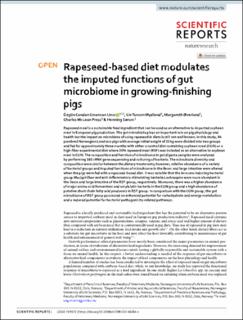| dc.contributor.author | Umu, Özgün Candan Onarman | |
| dc.contributor.author | Mydland, Liv Torunn | |
| dc.contributor.author | Øverland, Margareth | |
| dc.contributor.author | Press, Charles McLean | |
| dc.contributor.author | Sørum, Henning | |
| dc.date.accessioned | 2020-11-11T13:13:08Z | |
| dc.date.available | 2020-11-11T13:13:08Z | |
| dc.date.created | 2020-09-23T12:22:19Z | |
| dc.date.issued | 2020 | |
| dc.identifier.citation | Scientific reports, 2020, 10, 9372 | en_US |
| dc.identifier.issn | 2045-2322 | |
| dc.identifier.uri | https://hdl.handle.net/11250/2687427 | |
| dc.description.abstract | Rapeseed meal is a sustainable feed ingredient that can be used as an alternative to imported soybean meal in European pig production. The gut microbiota plays an important role on pig physiology and health but the impact on microbiota of using rapeseed in diets is still not well known. In this study, 84 purebred Norwegian Landrace pigs with average initial weight of 25 kg were divided into two groups and fed for approximately three months with either a control diet containing soybean meal (CON) or a high-fiber experimental diet where 20% rapeseed meal (RSF) was included as an alternative to soybean meal in CON. The composition and function of microbiome in gut digesta samples were analyzed by performing 16S rRNA gene sequencing and culturing of bacteria. The microbiota diversity and composition were similar between the dietary treatments; however, relative abundance of a variety of bacterial groups and imputed functions of microbiome in the ileum and large intestine were altered when the pigs were fed with a rapeseed-based diet. It was notable that the immune-inducing bacterial group Mucispirillum and anti-inflammatory stimulating bacteria Lachnospira were more abundant in the ileum and large intestine of the RSF group, respectively. Moreover, there was a higher abundance of major amino acid fermenters and amylolytic bacteria in the CON group and a high abundance of putative short chain fatty acid producers in RSF group. In comparison with the CON group, the gut microbiome of RSF group possessed an enhanced potential for carbohydrate and energy metabolism and a reduced potential for bacterial pathogenicity-related pathways. | en_US |
| dc.language.iso | eng | en_US |
| dc.rights | Attribution-NonCommercial-NoDerivatives 4.0 Internasjonal | * |
| dc.rights.uri | http://creativecommons.org/licenses/by-nc-nd/4.0/deed.no | * |
| dc.title | Rapeseed-based diet modulates the imputed functions of gut microbiome in growing-finishing pigs | en_US |
| dc.type | Peer reviewed | en_US |
| dc.type | Journal article | en_US |
| dc.description.version | publishedVersion | en_US |
| dc.source.volume | 10 | en_US |
| dc.source.journal | Scientific Reports | en_US |
| dc.identifier.doi | 10.1038/s41598-020-66364-4 | |
| dc.identifier.cristin | 1832485 | |
| dc.relation.project | Norges forskningsråd: 233685 | en_US |
| dc.source.articlenumber | 9372 | en_US |
| cristin.ispublished | true | |
| cristin.fulltext | original | |
| cristin.qualitycode | 1 | |

